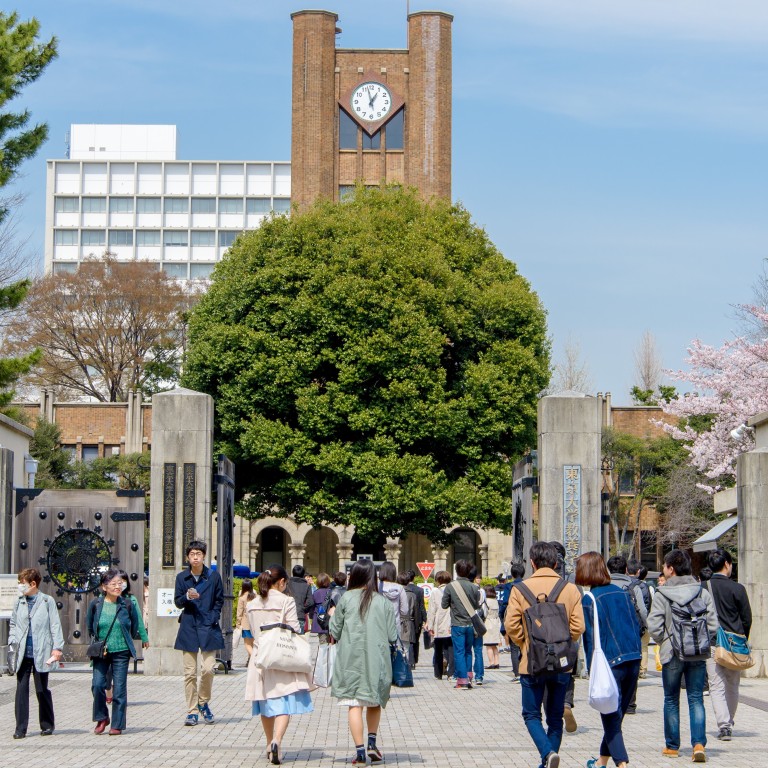
Japan’s foreign students struggle with high bar for coronavirus aid
- Nearly four in 10 foreign students in Japanese universities are from China and they are among those who must meet extra criteria to qualify for financial aid
- The money is meant to help those who have lost income from part-time jobs and professors are asking the government to treat all nationalities equally
Unfortunately, Wang is not Japanese and is still not sure if she meets the criteria to receive the assistance. A group of professors has taken up foreign students’ cause, calling on the authorities here to support students who are facing hardship no matter their nationality, but she is still waiting.
“It’s a big problem and it’s very worrying for me and my friends,” said Wang, 26, who is studying ethics and Japanese thought in the graduate school of Kobe University. “I used to work as a Chinese language teacher, but nobody wants to study now so there are no students for me.
“I don’t plan to go home because the biggest problem would be coming back to Japan later to continue with my studies.”
Japan’s suicide rate is falling – except among its young people
Wang, from Zhuzhou city in Hunan province, has filled in the paperwork from the Japanese government to receive a one-time payment of up to 100,000 yen (US$935) – and is waiting to hear if she has been successful.
While domestic students in tertiary education need only show they are paying fees and have experienced a decline in income from part-time jobs, the bar has been set higher for foreign students.
Wang and other foreign students need to prove they have attended at least 80 per cent of their classes and have received a grade-point average of at least 2.3, effectively meaning a consistent score of between 76 and 79 per cent in tests and coursework.
When it announced the policy last month, the education ministry justified the extra criteria on the grounds the funds should be allocated to people who would contribute to Japan in the future. Many foreign students, however, will return to their home countries after completing their courses.
For some, who are juggling part-time jobs to make ends meet, that can be a tall order.
“The money that they are suggesting is not enough to live on for very long,” Wang said. “But it will be better than nothing if I can receive it.”
She complained, however, that the paperwork was “confusing”, the deadlines for submitting all the details were demanding and that many of her friends had simply given up because the process was too complicated.

01:11
Japan’s economy gets US$1.1 trillion stimulus after coronavirus state of emergency ends
Hang Le, from the Vietnamese city of Hai Duong, has been studying at Kobe Shinwa Women’s University for three years. Le, 27, lost both her part-time jobs at the start of the pandemic and feels lucky to have managed to pick up a couple of shifts a week again recently.
“I am much luckier than a lot of people so I don’t complain,” she said. “I have a monthly scholarship so at least I have enough to eat and I get support from my family for my living expenses.
“But there are many people who are not so fortunate, who cannot work, receive no subsidies and don’t even have accommodation,” she said. Those are the people who are really struggling to meet the criteria on attendance and grades, she said.
Professors have expressed support for their foreign charges, with Maya Hamada, a professor of contemporary Chinese literature at Kobe University, spearheading a campaign to encourage the ministry to soften its stance.
“I was shocked when I saw that they would make it harder for foreign students to receive support,” she said.
“The biggest problem for my students has been that they cannot get to their home countries from Japan and they have lost their part-time jobs, which they really relied upon to survive,” she said. “Those problems, in turn, are very stressful and are causing them mental problems. Many of them feel that the Japanese government does not welcome them here any more.”
Working with other professors, Hamada launched a petition in the academic world and collected more than 1,700 signatures – including that of Kyoto University President Juichi Yamagiwa – before it was submitted to the government this month. The ministry has not replied to the petition.
In Japan, University of Tokyo fires AI professor over ‘will not hire Chinese’ tweet
A statement submitted with the signatures says, “For us professors, all the students we are teaching are ‘students who are learning at university in Japan and we cannot imagine distinguishing between them by their nationality when providing them with support.”
The statement adds that it is mistaken to refuse to help students who will return to their home countries after completing their courses as these young men and women will act as “valuable bridges” between the nations.

“We are also getting a lot of support from the universities themselves and the message that we have is very simple; it is that they should not discriminate against students based on where they are from,” Hamada said.
There has been a sharp increase in the number of foreign students in Japan, according to the Ministry of Justice. In 2008, there were 138,000 students from overseas enrolled on courses; by 2019, that figure had soared to 333,253. Chinese account for the largest single nationality, with nearly 40 per cent of the total, followed by 23.5 per cent from Vietnam, 8.4 per cent from Nepal and nearly 6 per cent from South Korea. Ministry figures also show the vast majority work part-time to support themselves.

